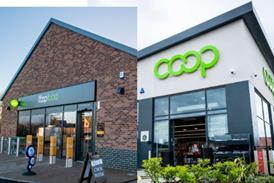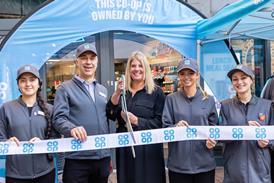David Knight
Knight’s Budgens, Hassocks and Henfield, West Sussex David regularly speaks to his MP and local council to raise issues, and his MP is a regular visitor to the store
Linda Williams
Broadway Convenience Store, Edinburgh Linda and her husband Dennis have worked hard to build relationships with their MP, MSP and councillors
Mark Canniford
Spar, Weston-super-Mare, Somerset Mark is also a district councillor and this role helps ensure his customers’ opinions are aired
Harj Dhasee
Nisa Village Stores, Mickleton, Gloucestershire Harj works closely with his parish council to help drive improvements to his local area
Do you take an interest in politics, either nationally or locally?
David: I work closely with the parish and district council, although I try not to get drawn into standing up for one particular political party. I also sit on a local board where we discuss things happening in the community. They actually have quite a standing in Hassocks and managed to raise £250,000 which succeeded in preventing the woods in Hassocks from being barricaded off to walkers.
Linda: I don’t take an interest in party politics exactly, but I do in a societal way because I am very interested in how politics affects people’s lives.
Mark: I take an interest in national politics, but am actively involved in local politics as a district councillor. We meet regularly to discuss anything that is happening within our district.
Harj: Yes to both. I work closely with the parish council, discussing events and ways in which we are able to improve the village.
How important is it from a business point of view to keep up to date with political policy discussions and legislation, both actual and proposed?
David: It’s important to engage locally, to share your point and put your views across to your local MP, as this can generally lead to better things. We keep up to date by keeping a close relationship with the parish council. People think parish councils don’t have much power, but they generally write the community plans which are then adopted by the council.
Linda: It’s important to keep up to date with the latest discussions because you must be able to protect yourself, your business and your livelihood. You never know when something may change, so it’s good to be in the know.
Mark: It’s very important to keep up to date with discussions and legislation, whether I support it or not. However, I do find small voices struggle to be heard, meaning fights against certain proposed actions can be difficult, even as part of the council.
Harj: Very, especially proposed plans. You have to keep on top of anything that could have an effect on your business.
Have you ever spoken to your local MP?
David: I speak to my MP about once a quarter about particular issues which may be bothering me. These can be personal, about the business or community-led. These conversations can be very beneficial because our MP is also in the Cabinet, so you get a real flavour of what the government is thinking.
Linda: We speak regularly to our MP, MSP and local councillors. We tend to speak to them all about the same issues as they all have a different opinion to give. The MSP, however, is very engaged with the convenience sector and our relationship with him has been very advantageous as we have managed to gain access to meetings with people we otherwise wouldn’t have been able to.
Mark: I never really make specific appointments to see him; I usually end up meeting him at events or functions which I attend on behalf of the council. The last issue I spoke to him about was going dark. He thought it would affect sales negatively, whereas I thought they would increase my sales and, thankfully, I was right. If anything, this just enhances the fact that MPs should listen to small business owners more as they are the ones in the trade.
Harj: I speak regularly to my MP; he guides me towards in the right direction when I have an issue I’d like to discuss. For example, I went to him with an idea to campaign about over-development in the village and he was very helpful in helping me build up a team and lobby about it.
Would you ever invite your local MP to your shop?
David: My MP is more than happy to come to the store when we invite him; usually we time this with an event they are supporting. They like the publicity and photo opportunities. It is at these events that I’m able to speak to him about any issue.
Linda: Our relationship with our MSP began when he came into our shop to introduce himself as the new MSP. Since then he regularly comes in, not to shop as he doesn’t live locally enough, but to discuss current topics, or to see if we have anything we would like to share.
Mark: My previous MP used to come to my shop quite regularly; he even worked in the shop for a day to see what it was like.
Harj: My local MP has been in my shop several times, all on a pre-arranged basis, as he lives too far for me to be his local shop. I have also organised meet and greet sessions for him in the village. He is always very keen to attend events as it is good publicity for him.
Have you considered getting involved in local politics?
David: No, I think that as a business owner who serves a large mix of people it isn’t right to make my private politics known as not everyone would be on my side. However, I’d be happy to talk to anyone privately; you just have to be careful.
Linda: Dennis has been toying with the idea for a while, but it’s just too time-consuming at the moment.
Mark: I am very much involved; I just wish small businesses were listened to more and our opinions were valued. I only really became involved because I’m better off fighting from the inside rather than sitting on the outside complaining.
Harj: I would never push my political views onto my customers, but I like to think I use my political knowledge to help the community.
Do you communicate well with local politicians, such as councillors, and why do you think this is important?
David: It’s important because it’s good to know what’s going on. The parish council were the first people to warn us about plans to build a Sainsbury’s Local in the town, which has now been built. I get to see them quite a lot as many of its members shop in my store.
Linda: Dennis is the chairman of our local community council and has been for 12 years. We see this group most regularly as they meet once a month. Other politicians we tend to meet when it’s required.
Mark: I communicate very well with the council. Small businesses see a lot of people each day so it’s important that local politicians do listen to us and that we do communicate properly.
Harj: Communication is vital because, more than anything, it can be beneficial for the community. Through good relationships with politicians and councillors I’m able to help residents communicate with them, too, whereas they may not know where to turn ordinarily.
What is the most successful campaign you’ve taken part in?
David: Each year we put on an event for the community called Light up Hassocks. It used to be really small, but has grown to be a huge event, drawing 6,000 people. Because it is so large-scale we have to work with the local councils and businesses to secure road closures and health and safety checks.
Linda: The most successful campaign was getting CCTV cameras inside the local shopping precinct, as well as recycling units outside of it. We had up until recently been fighting against Aldi (who put plans in to come to the town) with the help of our local MP, MSP and council. Unfortunately, money talked and we lost. However, I’m very proud of the campaign we put together; we wouldn’t have been able to do it if we didn’t have the relationships we do.
Mark: About two years ago Tesco put in a petition to build about two or three miles from me, so although this wouldn’t have affected me directly, it was part of my district. With help from local people and members of the council we were able to stop them and so far Tesco hasn’t tried to come back again.
Harj: With the help of two others, I campaigned to get defibrillators in the village. This entailed fundraising, building awareness and training.
What are you campaigning about at the moment?
David: I am not campaigning about anything at the moment. However, I would like to speak to my local MP about the living wage and the Budget in general as I feel there is little recognition of small businesses. In order to facilitate higher pay, we need relief in costs elsewhere.
Linda: We are lobbying about the Deposit and Return scheme for packaging which has been put forward in Scotland. If it goes through it means customers can return their used cans, cartons or bottles and we will have to recycle them. Considering the amount we sell, this throws up a lot of issues. Where do we put it all? What will the security measures be? How do we go about recycling it? How will we ensure everything’s washed before it’s returned?
Mark: As a retailer nothing, but as a council member we are seeking to improve our area visually. I would like to speak to my MP about red tape issues, such as pension contributions, carrier bag charges and the living wage.
Harj: We aren’t campaigning at the moment, but we are working on projects to maintain close links with the community. Through Making a Difference Locally, I am raising £4,000 to have the fountains in the village cleaned up. So far I’m only £250 short.
Retailer influence
Do you think retailers are a vital resource for politicians to use?
David: I think singularly we don’t have much of an impact, but as a team we do. The board I sit on has gradually been getting smaller and smaller and this worries me. Retailers have a good overall opinion of the community because of the diverse group of customers they serve, and can bring some very valuable options to the table because of this.
Linda: If a politician is sensible then they should be listening to their retailers. We are very influential and have a good idea of what the community wants. People discuss things in our shop so we are able to pick up the public’s general opinions on particular issues.
Mark: If a politician sees something in it for them, or thinks it may be beneficial to their status or reputation, I believe they are more inclined to use us retailers.
Harj: Certainly, as retailers can speak volumes on behalf of their politicians. We are able to communicate with the community to help get their message across. Retailers see many people on a daily basis, and being an embedded village store, there is a definite element of trust there.
Trade associations
In what ways do you support trade associations in their lobbying activity?
David: I attend many trade association events, especially those run by the Association of Convenience Stores (ACS), which always supply good and easy-to-read literature. I use this to support the cases I choose to lobby on.
Linda: Dennis sits on the board at the ACS so we have a good relationship with the group and support them in many of their lobby events. We are also National Federation of Retail Newsagents (NFRN) members and take an interest in the local Scottish council, too.
Mark: I used to be a member of the NRFN, but I found their lobbying unsuccessful and became quite disheartened with the whole system. Unfortunately, with my shops and time I give to the district council I don’t have time to lobby on behalf of organisations like the ACS.
Harj: I work closely with the ACS, attending all their events and speaking with them regularly. The ACS is great for advice and information; they are a huge asset for retailers as they help to put our thoughts across to larger organisations.
Source
Katherine Brook


























No comments yet